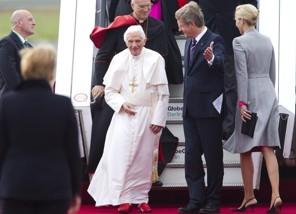Washington Post
September 22, 2011
http://www.washingtonpost.com/world/europe/pope-benedict-xiv-to-arrive-on-4-day-state-visit-to-address-parliament-amid-protest/2011/09/22/gIQAAnCpmK_story.html
 |
| ( no / Associated Press ) - German Chancellor Angela Merkel, left, President Christian Wulff , 2nd from right, and his wife Bettina Wulff, right, welcome Pope Benedict XVI, 2nd from left, as he arrives at the airport Tegel in Berlin, Germany, Thursday, Sept. 22, 2011. Pope Benedict XVI is on a four-day official visit to his |
BERLIN — Pope Benedict XVI warned Germans of the danger of ignoring religion as he began the first state visit to his homeland Thursday, seeking to stem the tide of Catholics leaving the church while acknowledging the damage caused by the clerical sex abuse scandal.
He is expected to be greeted by large protests and a boycott by some lawmakers when he addresses parliament later in the day but also by larger crowds of Catholic faithful.
"We are witnessing a growing indifference to religion in society," he said at a formal welcoming ceremony at the German president's Bellevue palace, touching on a major theme of his papacy.
He called religion a foundation for a successful society and said its values were essential for freedom.
Benedict said the presidential palace, which was destroyed in World War II, was a reminder of German history.
"A clear look at the past, even at its dark pages, enables us to learn from it and to receive an impetus for the present," the pope said.
The Bavarian-born pontiff was met on a red carpet at Berlin's Tegel airport by German Chancellor Angela Merkel and President Christian Wulff at the start of his four-day visit. Howitzers fired a ceremonial salute as the pope stepped off his plane, and Eurofighter jet escorts flew overhead.
Merkel introduced the pope to members of her Cabinet. He then greeted members of the German Catholic Church and children who stood waiting for him with small yellow-and-white Vatican flags and presented him with a bouquet.
Benedict blessed the children before moving on, accompanied by Merkel and President Wulff to his car.
A tiny group of about 20 protesters stood outside the airport, holding banners with slogans like "against anti-Semitism, sexism and homophobia" and "my body, my choice."
The pope was to speak later in parliament, which about 100 opposition lawmakers have vowed to boycott in protest over what they consider a violation of Germany's separation of church and state. Another 10,000 people are expected to demonstrate outside.
More than 250,000 people are registered attend his Masses, many at an open-air service Thursday night in Berlin's Olympic Stadium.
The Vatican's views on contraception, the role of women, homosexuality and its handling of the sexual abuse scandal that rocked Germany last year are seen by many in Germany as outdated and out-of-touch.
On the plane, the pope told reporters that he found demonstrations were acceptable as long as they remained civil.
They are "normal in a free society and in the secularized world," he said.
The pope plans meetings with leaders of Germany's Jewish and Muslim communities, three Masses, an ecumenical service with Lutheran church members and possibly meetings with victims abused by priests. Benedict was not expected to meet with German dissidents who have called for such changes as allowing women priests and ending mandatory celibacy for priests.
He told reporters on the plane that there needs to be an examination of why people have been leaving the church recently, and the part that the abuse scandals played in the phenomenon.
"I can understand that some people have been scandalized by the crimes that have been revealed in recent times," he said. There both "good and bad fish in the Lord's net" and Catholics have to live with scandal, he said.
The German president, himself Catholic, warmly welcomed the pope and praised the role played by the Church in supporting German reunification more than 20 years ago. But, at the same time, Wulff clearly expressed understanding for the many Germans who can no longer relate to a church.
"It is important for the Church to remain close to the people and not to turn inward on itself," Wulff said.
The president also broached a personal issue, that as a remarried divorcee, he is not allowed to accept communion.
"Many ask themselves how mercifully it treats people who have suffered breakups in their own lives," Wulff said.
Vatican spokesman the Rev. Federico Lombardi said the president's remarks were "beautiful and very sincere," calling them a fair summation of the problems facing the church in Germany.
Any original material on these pages is copyright © BishopAccountability.org 2004. Reproduce freely with attribution.